Читать книгу Market Theory and the Price System - Israel M. Kirzner - Страница 21
На сайте Литреса книга снята с продажи.
THE CONDITIONS UNDER WHICH THE MARKET OPERATES
ОглавлениеWe are considering the theoretical operation of a market system. The model of the market we will be working with can be characterized by the set of ideal conditions governing the model, which we construct for the purpose.
In a market system each member of the society is free to act, within very wide limits, as he sees fit. Moreover, the system operates within a framework of law which recognizes individual rights to private property. This means that each individual is free at each moment to employ the means available to him for the purpose of furthering his own ends, providing only that this should not invade the property rights of others. At the same time each individual can plan his activities with the assurance provided by the law, first that the means available to him at any one time are secure against appropriation by others, and, then, that he will not be prevented by others from enjoying the fruits of his productive activities.
The system recognizes the rights of individuals to enter into arrangements with one another which they believe will be of mutual benefit. Individuals may act cooperatively either by pooling their resources to produce jointly, or by each agreeing to specialize in one kind of production and to exchange parts of their production, or by the one agreeing to furnish productive services to the other in return for finished products or their equivalent. Our ideal system may be thought of as, in one way or another, ensuring the smooth fulfillment of such cooperative arrangements. Contracts are made in good faith, and contractual obligations are fulfilled to the letter.
Members of the system, being human beings, at any one time have likes, dislikes, and preferences; each follows his own moral standards. Each member acts to fulfill “his own” purposes: but these purposes are not necessarily “selfish” ones and they may be directed toward alleviating the pain of others; and so on. Each member has more or less imperfect knowledge of the facts surrounding his field of action; each, in some degree, possesses curiosity, intelligence, determination; each has potential or actual talent for some or other activities, depending on his (natural or acquired) physical and other qualities.
Members of the system need not be aware of the entire scope of the market system or of the theory of its operation, but we may assume them to be generally content to seek to achieve their purposes within the framework of the system as they find it. In other words, while we make no other assumptions concerning the nature of the actions of individual members, we are assuming that no activity is expended with the sole purpose of replacing the market system by some system of societal organization governed by conditions substantially different from those outlined here. The system is thus consistent with the existence of the political and coercive apparatus associated with government, only to the extent necessary to ensure the maintenance of the conditions of a market system.
A society based on these conditions, starting from a previous state of individual autarky, without any specialization or exchange, can be seen as rapidly developing into an intricate exchange system. For such a successful development to occur it is however necessary that some commodity emerge in the market which is a generally accepted medium of exchange. With exchange confined to direct barter of goods or services for other goods or services, there can be only a limited scope for market activity. It can be confidently assumed however that the existence of market activity, even if limited, will create numerous opportunities for individuals to improve their positions by engaging in indirect exchange. An individual would give goods or services in return for goods that he does not himself desire, in hope of being able to exchange these goods later on for others that he does desire (but that cannot be had in exchange for his original goods or services). Widespread activity involving such indirect exchange can in turn aid the emergence of a commodity generally accepted as a medium of exchange.
Individuals will readily accept this commodity (money) in exchange for their goods or services, having complete confidence in their ability to use this commodity whenever they wish, to buy other goods or services at prices (in terms of the money commodity) more or less definitely known in advance.
For the purposes of the market system analysis undertaken in this book, we may assume that the system’s history includes the evolution of a fully developed monetary machinery. The market has become completely adjusted to a system of money; all economic calculation is carried out in terms of money values, all prices are money prices, and all market transactions are exchanges of goods or services against money. (Nevertheless, for our purposes, we assume that the market operates exactly as it would operate without the existence of a money supply, but simply enjoys freedom from the inconveniences connected with direct barter. In other words money is assumed to succeed in lubricating the wheels of exchange, without itself actively directing exchange activity into channels other than those that would in principle be used in the absence of money.)1
